Discover the vibrant traditions and customs of the Vietnamese Lunar New Year. Join the celebration this year and experience the joy of Tet with family and friends!
Tet, officially known as "Tet Nguyen Dan", is Vietnam's most significant and joyful holiday. It marks the beginning of the lunar new year, bringing families and communities close together to usher in a fresh start, express gratitude to ancestors, and wish for a prosperous future. This article will guide you as we uncover the traditions, Tet traditional foods, and some of the best cities to experience the magic of the Vietnamese Lunar New Year 2026.
1. When is Vietnamese Lunar New Year 2026?
Vietnamese Lunar New Year, also known as Tet Nguyen Dan or Tet, is the most important festival in Vietnam. It is celebrated on the first day of the first month in the Lunar Calendar (normally in late January/ early February in the Western/Gregorius calendar).
In 2026, the Vietnamese Lunar New Year will fall from Saturday, February 14th to Sunday, February 22nd, marking the beginning of the Year of the Horse.
However, in reality, the festivities often begin several weeks before the official date as most families prepare to welcome the new year.
2. Vietnamese zodiac 2026: Horse
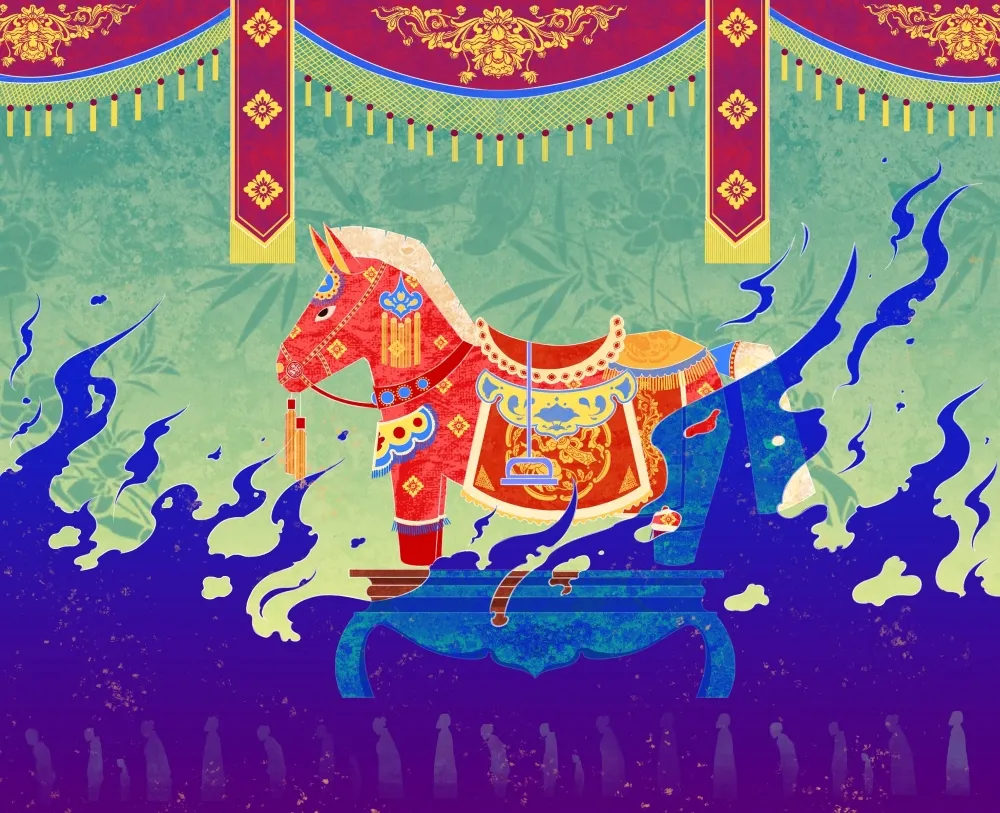
Ngua Dan Linh (Artist: Pham Thu Thao)
The Vietnamese lunar calendar operates on a 12-year cycle, with each year associated with an animal. These are the 12 animals of the Vietnamese Zodiac: Rat, Buffalo, Tiger, Cat, Dragon, Snake, Horse, Goat, Monkey, Chicken, Dog, and Pig. 2026 will be the year of the Horse.
If you were born in the year of the Horse, your birth year falls on one of the following dates: 2014, 2002, 1990, 1978, 1966, 1954, 1942, and so on. The Horse is recognized as one of the most dynamic and free-spirited signs in the Vietnamese Zodiac. Individuals born under this sign are often associated with remarkable qualities such as vibrant energy, a strong sense of independence, and a passionate zest for life.
3. Vietnamese Lunar New Year traditions
The three-period timeline for the Vietnamese Lunar New Year:
Days before New Year's Eve
New Year's Eve
Days around one week after New Year's Day
3.1. Before New Year's Eve
In the days preceding Lunar New Year's Eve, people participate in a range of activities in the spirit of renewal and prosperity.
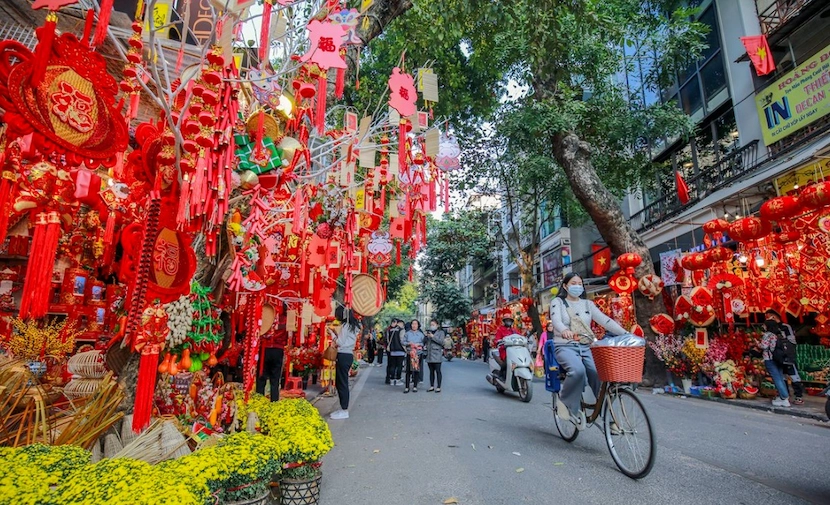
Worship the Kitchen God
Though it may not be as well-known as the Vietnamese Lunar New Year, Tết Táo Quân, or Kitchen God Day, is equally as significant in Vietnamese culture. The origin of this special day starts from a touching story of three people: Trong Cao, Thi Nhi, and Pham Lang, who became gods after tragic love stories. the moral of the story/ies is that if you live with kindness, good things come to you.
On the 23rd day of December in the Lunar New Year, Vietnamese people believe these three gods go to heaven to talk to the Jade Emperor and pray for a great year ahead, then they return to Earth on New Year's Eve to look after everyone.
Therefore, families will prepare offerings, like fruits, candies, sticky rice cakes, and incense, to honor the Kitchen God. After that, they’ll burn the joss package including heaven banknote, incense, Kitchen God joss paper clothing, and more. This activity symbolizes the act of sending the gods back to heaven.
Moreover, Vietnamese people also release live carp into a river or pond as a means of transportation for the Kitchen God to go to heaven.
Clean the house
Weeks prior to Tet, Vietnamese households often do a thorough cleaning of their homes. This practice is rooted in the belief that, by cleaning, they can get rid of the bad luck of the previous year and start a new journey.
Decorate houses and offices
In addition to tidying up, Vietnamese people decorate their homes and offices with various decorations, typically in shades of red or yellow. The most iconic ones are the peach blossom, kumquat tree, orange tree, or yellow apricot blossom.
Get new bills of money
A unique Tet tradition involves getting new bills of money. These new banknotes are not kept for personal use. Instead, they are used to hand out "lucky money" to family members and friends during the New Year. This practice is a symbol of good wishes and blessings for the year ahead, particularly for the younger and elder members of the family.
Make Banh Chung (Chung Cake)
Before New Year's Eve, Vietnamese family members often gather to make a special dish called "Bánh Chưng." It's a square sticky rice cake made by wrapping sticky rice, mung beans, and pork in banana leaves and then boiling it for 10-12 hours over a wood fire.
3.2. On Vietnamese New Year’s Eve
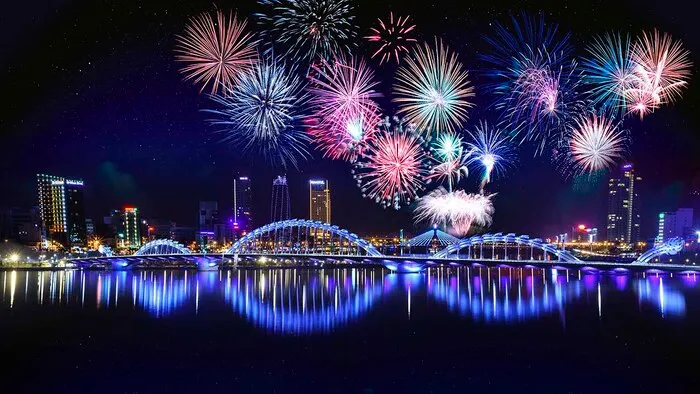
Some activities Vietnamese people often do on New Year’s Eve include:
Have a year-end meal
This is the last meal of the year. Family members will gather together, having a special dinner with a lot of delicious dishes such as Banh Chung, braised pork with eggs, boiled chicken, fried spring rolls, bamboo shoot soup, and more.
Watch the Tao Quan TV show
Vietnamese people of all ages love watching "Tao Quan" on TV. This comedy show humorously recaps the significant events of the year of Vietnam in general.
Watch firework shows
Fireworks have long been an integral part of New Year's Eve celebrations in Vietnam. In major cities like Hanoi, Ho Chi Minh City, and Da Nang, impressive firework displays light up the night sky with vibrant colors and breathtaking patterns. Families often gather in parks or open spaces to watch these beautiful displays together.
Offer incense to ancestors
Vietnamese people believe in honoring their ancestors. On Vietnamese New Year’s Eve, they burn incense incense at their ancestral altars. This is a sign of gratitude and respect to those who passed away before and a way of seeking their blessings for the year ahead.
First foot (Xông Nhà)
On New Year's Eve, families perform the "Xông nhà" ritual which is a time-standing Vietnamese custom with deep historical roots. The tradition involves the homeowner inviting a successful and happy person (could be a family member, friend,...) to be the first one to step through the door after New Year's Eve. That person is believed to have a good zodiac compatibility to bring good luck, success, and happiness to the family for the year ahead.
3.3. New Year’s Days - Tet Days
Tet starts from the first day of the Lunar Calendar month to the third day at least. Here are some of the most popular things Vietnamese would do on the days following New Year’s Day.
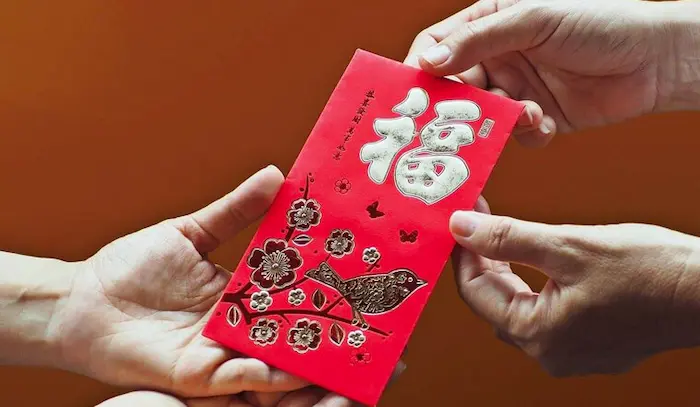
Visit relatives and friends, and give lucky money
During these days, people often wear new clothes and visit their relatives and friends to exchange New Year's greetings. They also give lucky money to children and elders as a sign of good luck and prosperity for the new year.
Buy salt on New Year’s first day
Another tradition is buying salt on the first day of Tet. Salt, in many countries, including Vietnam, is associated with the idea of preserving good luck and warding off evil spirits. So, people buy salt at the beginning of the year, hoping their family will stay close and get along well.
Visit pagodas or temples and ask for couplets from scholars
Additionally, Vietnamese people visit pagodas and temples to pray for a happy new year. They also go there to show their respect and appreciation to Buddha and the Gods who have been protecting them and granting their wishes.
This practice involves asking scholars (Ông Đồ - calligraphy masters) for couplets, which are believed to carry some of the scholar's wisdom acting like a wish that can bring luck to their homes and the lives of their children.
People may request specific calligraphy letters or words, either in Sino-Vietnamese or Vietnamese, that represent their aspirations and dreams for the upcoming year. For instance, they might choose characters like "Phúc" for happiness, "Lộc" for wealth, "Thọ" for longevity, "Đức" for virtue, "Trí" for knowledge, or "Tài" for talent. They serve as constant inspiration for people to strive towards their goals throughout the year, embracing the qualities and values represented by the calligraphy in their daily lives.
Choose a good day to depart
What’s more, Vietnamese people tend to pick a lucky time to depart - Xuat Hanh because they believe that how they start the first day will affect their luck all year. Many ask fortune tellers or use astrology to decide when to leave home, get back to work, or get married.
4. Traditional food for Tet celebration in Vietnam
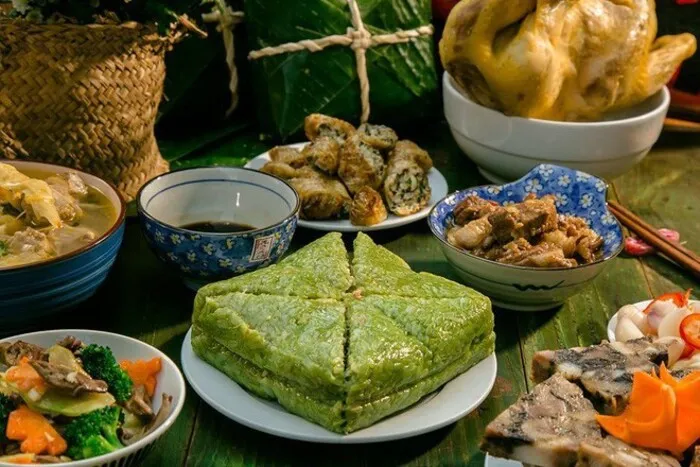
The Vietnamese Lunar New Year celebration features a wide and delicious variety of traditional dishes. Here are some of the most popular and meaningful ones.
Banh Chung / Banh Tet: These are the most iconic Tet foods. Banh Chung is a square-shaped sticky rice cake filled with mung bean paste and pork, all wrapped tightly in banana leaves or dong leaves. Banh Tet is a cylindrical version, mainly enjoyed in Southern Vietnam. Both are boiled for many hours and are symbols of the Earth
Gac sticky rice: This sticky rice dish gets its beautiful bright red color from the Gac fruit. It is seen as a powerful symbol of luck and good fortune, making it a must-have for the new year.
Braised pork with eggs: This rich dish features pork pieces simmered slowly in a caramel sauce made with fish sauce and coconut water, along with hard-boiled eggs. It is traditionally made in large batches and symbolizes family reunion and completeness. It's typically served in Southern region.
Vietnamese ham: Often called Vietnamese ham, this is a steamed pork sausage made from lean pork. It is typically sliced thinly and served as a rich side dish to balance lighter foods.
Spring rolls: Both fresh and fried spring rolls are popular Tet treats. The fresh ones are filled with ingredients like shrimp, pork, herbs, and vermicelli. They are fresh and fun to eat.
Pickles: Pickled scallions and veggies are crucial in many regions. They add a tangy, refreshing, and crisp contrast to the richness of the main Tet dishes, enhancing the overall dining experience.
Candied fruits: These are sweet treats like candied ginger, lotus seeds, coconut, and kumquats. They are usually offered to guests in beautiful, decorative trays and represent sweetness and happiness for the coming year.
See more: Traditional Vietnamese New Year's food
5. Taboos during Vietnamese Tet
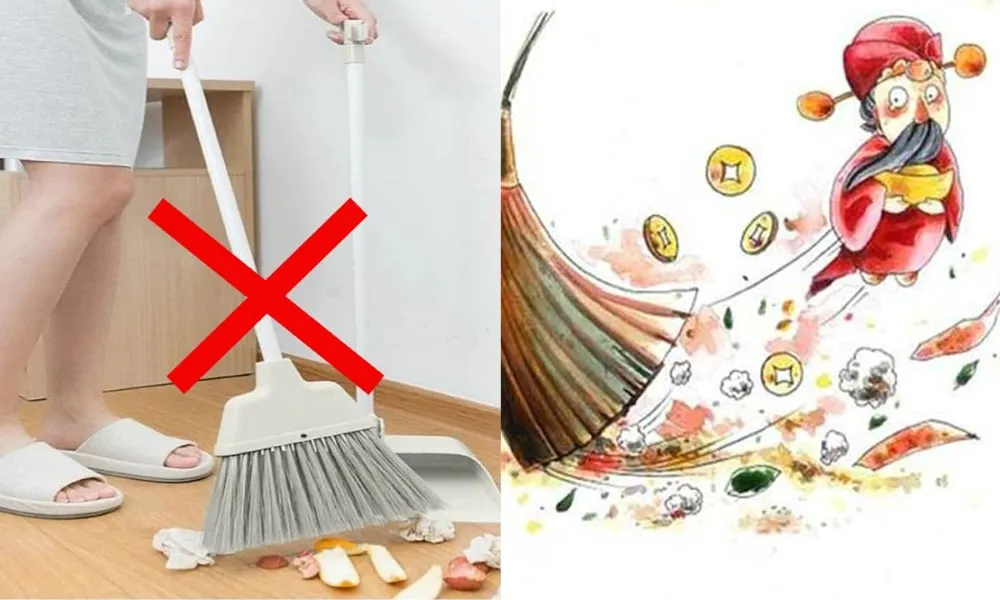
Tet is a very important occasion for Vietnamese people to successfully start a new year. To make sure the entire year is filled with good fortune, locals usually follow some key traditional rules throughout this special holiday.
Avoid black or white clothes: During Tet, most people stay away from wearing all black or dark clothes. These colors are traditionally linked to funerals. Instead, people choose bright red outfits, which stand for good luck and happiness.
Keep your words kind: It is important not to swear, curse, or get into arguments. People also avoid talking about sad things like accidents or death. Everyone tries to keep a happy, positive attitude and put on a smile, even in difficult situations.
Do not sweep on day one: Locals do not sweep the house or throw away trash on the first day of the New Year. People believe this action sweeps away the family's luck and wealth. Cleaning and sweeping are usually saved for after the first few Tet days.
Forget about money debts: People avoid asking others to pay back money or asking for loans during the first days of the year. This custom helps make sure you will not spend the whole year dealing with debts. Financial talks should wait a few weeks.
Skip "unlucky" foods: If you have specific hopes for the year, pay attention to what you eat. Foods like squid, duck meat, and shrimp are often avoided. Squid ink is black, ducks are sometimes seen as slow, and shrimp swim backward- all believed to bring bad luck.
However, in modern life, many Vietnamese families are flexible with these old customs. As long as the Tet atmosphere remains joyful and peaceful, that is the most important tradition of all.
See more: Vietnam manners - Dos and don'ts in Vietnam
6. Best places to celebrate Vietnamese Lunar New Year
If you're planning to experience Tet in Vietnam, consider visiting these cities known for their vibrant celebrations.
6.1. Tet in Hanoi
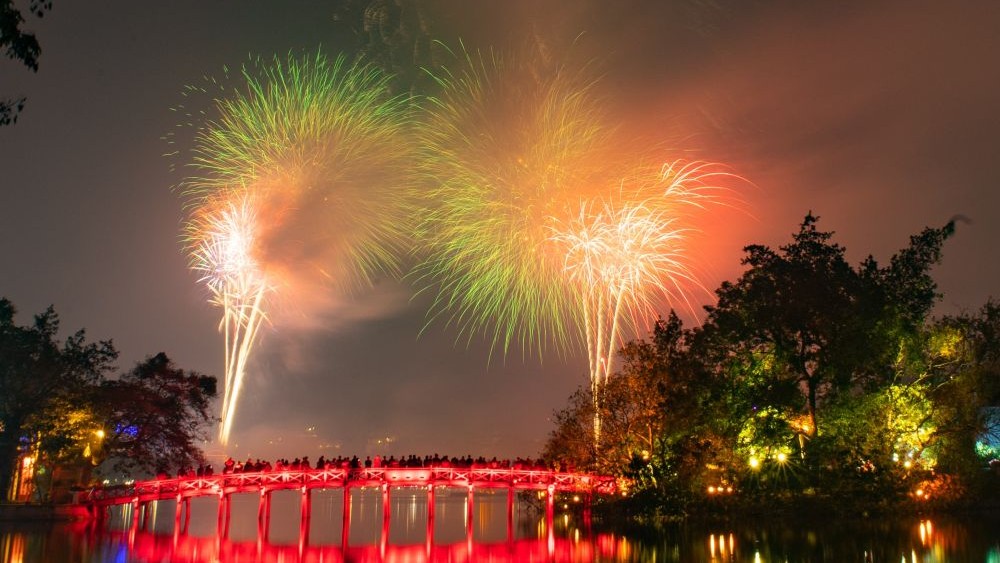
Hanoi, the capital of Vietnam, is a city full of old stories and deep culture. But it truly shines during the holiday!
During Tet, Hanoi gets a beautiful "makeover". The streets become bright and busy with colorful flower markets. You can see so many kinds of flowers everywhere! People also gather to enjoy traditional dances and happy music in the streets.
Hanoi is also home to many famous, beautiful temples. When Tet arrives, these places hold very special ceremonies. This is a great chance for visitors to watch old traditions and feel the spiritual heart of the holiday.
The most exciting time is on Lunar New Year's Eve! The sky above Hanoi suddenly explodes with magnificent fireworks. These bright colors light up the city's historic buildings, creating a truly magical and unforgettable sight.
6.2. Tet in Ho Chi Minh
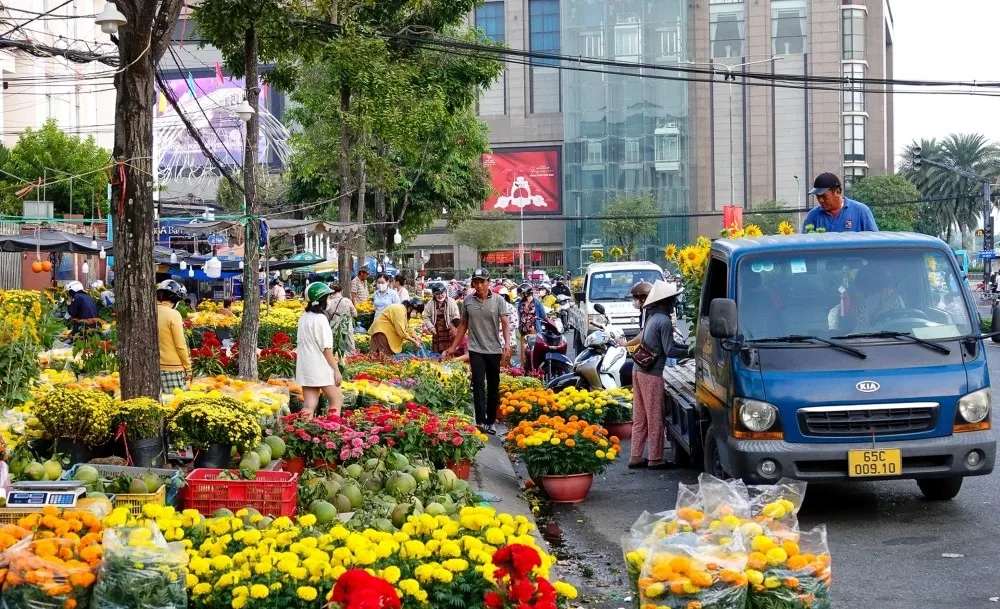
If you want a super lively and colorful Tet holiday, Ho Chi Minh City (HCMC) is a choice! This city is famous for its amazing nightlife, and New Year's Eve is even more exciting. There are many rooftop bars and clubs where you can join a fun countdown party. You will find fancy dinners, creative cocktails, and a busy, non-stop party atmosphere!
Besides the parties, you must visit the famous Nguyen Hue Flower Festival and the Tao Dan Flower Festival. These events change HCMC into a giant tapestry of colors. Every corner is decorated with bright yellow and orange flowers, like the beautiful apricot blossom. Walking there feels like stepping into a magical garden full of life and good luck!
6.3. Tet in Hoi An
Hoi An, a UNESCO World Heritage site, is a magical place to spend the Tet holiday. This ancient town, famous for its yellow houses and colorful lanterns, becomes even more beautiful during the Lunar New Year.
Walking through Hoi An feels like stepping back in time. During Tet, the streets are decorated with thousands of silk lanterns that glow brightly at night. The air is filled with the smell of traditional food and the sound of folk music and games being played. Many local families open their doors to share special Tet meals, giving visitors a real taste of Vietnamese hospitality. You can also watch the exciting lion dances that bring good luck for the new year.
6.4. Tet in Nha Trang
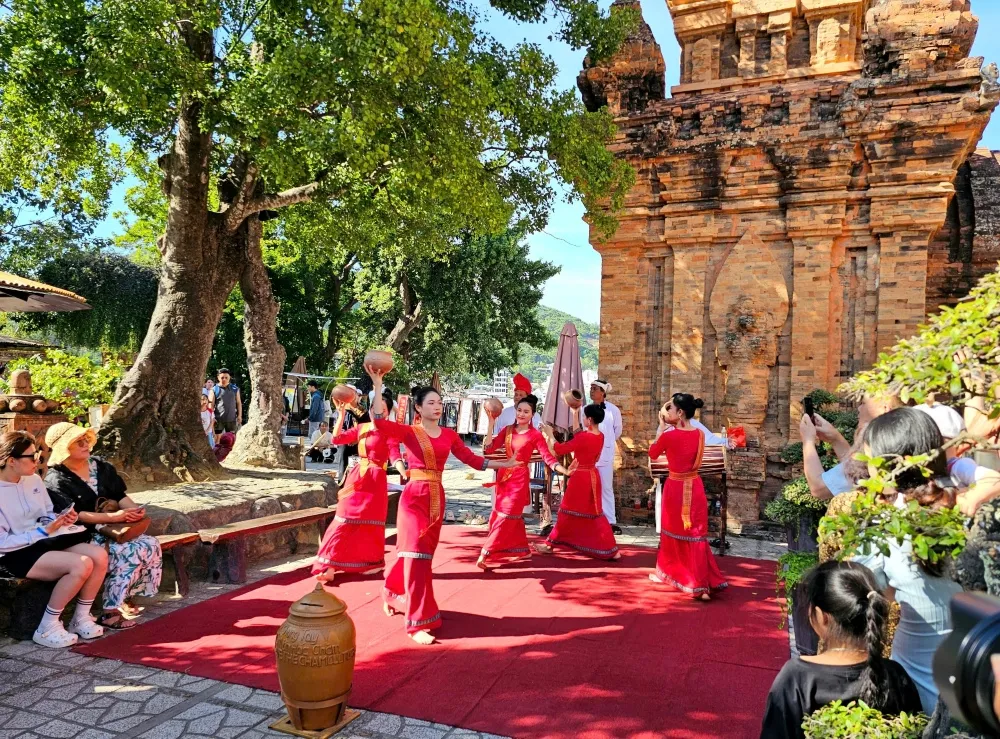
Nha Trang, a stunning coastal city in Central Vietnam, is an amazing place to celebrate the Tet holiday. During this time, the city comes alive with culture, especially at the ancient Po Nagar Cham Towers where special ceremonies are held. The popular Dam Market is filled with a festive spirit, making it a great place to shop for traditional holiday items, flowers, and bright Tet decorations.
Meanwhile, Nha Trang’s beautiful beaches and clear water offer a perfect spot for fun and relaxation. The pleasant weather means you can easily sunbathe, go snorkeling or diving, or take a boat tour to explore nearby islands. Nha Trang is a wonderful mix of traditional Tet culture and an ideal beach getaway!
From the meaningful cleaning rituals to the stunning fireworks displays, the Vietnamese Lunar New Year (Tet) is filled with beautiful traditions and exciting celebrations. For travelers and expats in Vietnam, joining the Tet festivities offers an incredible and warm look into Vietnamese culture and community life.
Join us, meet friendly locals, and make lasting memories. Click the button below to begin to discover, or simply contact our travel expert via email at [email protected]. We are here to give you detailed advice, quotes, and tailor-made itineraries!
See more:
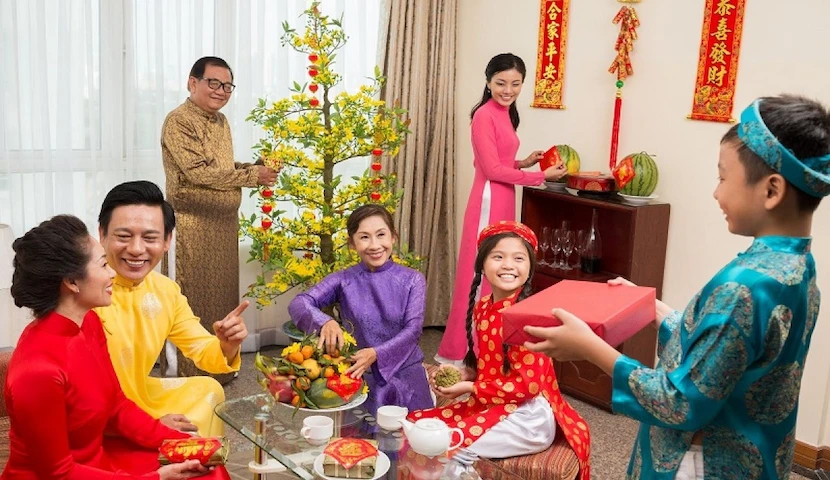






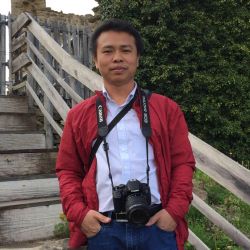
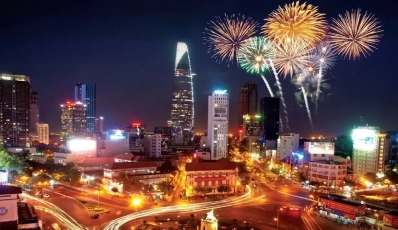

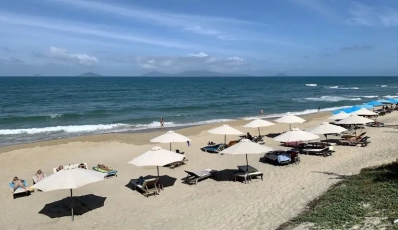
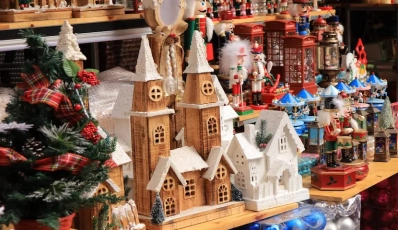



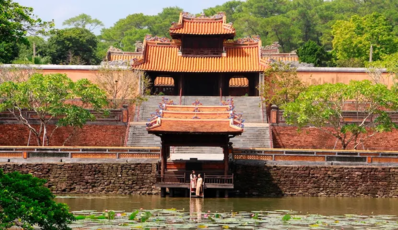
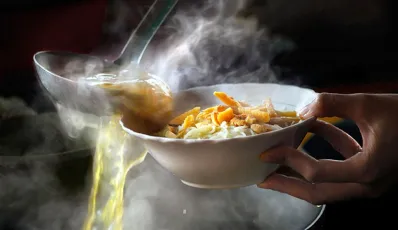

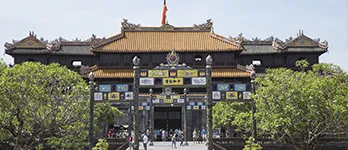
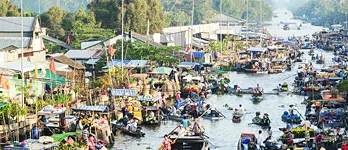

 TRAVELERS' CHOICE 2025
TRAVELERS' CHOICE 2025 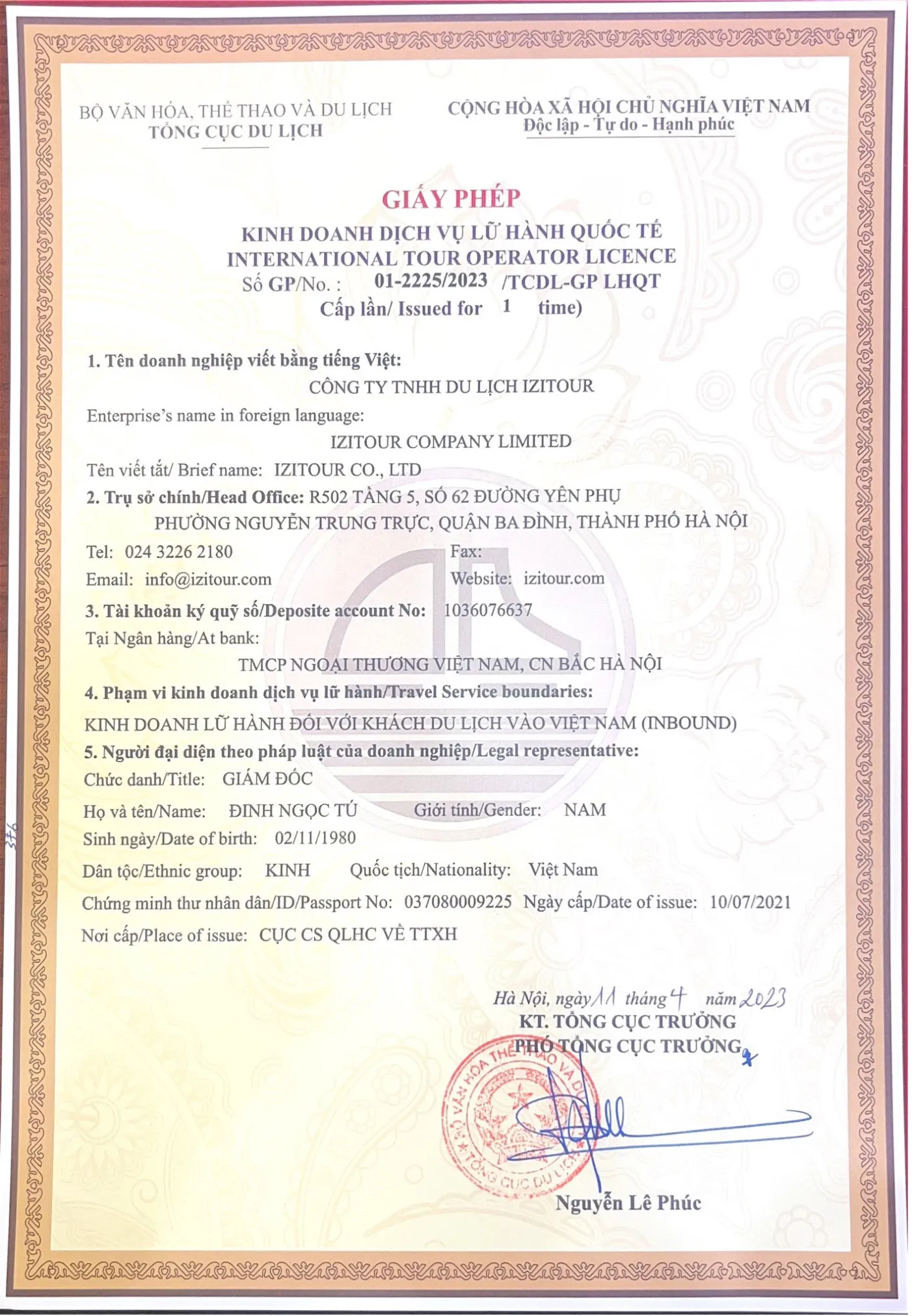



01 Comment
Australia
I was born in the year of Dragon. When I traveled, I saw many Asian favors the year of this mythical creature. They believe that people born in the year of the Dragon are confident, ambitious, charismatic, and strong-willed. Those are also known for their leadership qualities, enthusiasm, and desire for success.
Write Reply